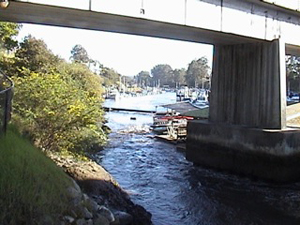Campus News
Tsunami puts boating program on hiatus: community reaches out to help
Last week’s tsunami wrecked nine boats belonging to the UCSC Boating Program, putting a damper on a 40-year-old Santa Cruz tradition.


Last week’s tsunami bashed up the Santa Cruz Harbor, wrecking an estimated $17 million worth of property including nine boats belonging to UC Santa Cruz. The storm also damaged the boating dock used by hundreds of UCSC rowers and boaters over the years.
Now a group of generous people, including members of the boating communities in and outside of Santa Cruz, is stepping forward to help UCSC recoup its losses and keep its boating program afloat.
Nine of UCSC’s 30-foot rowboats, valued at a total of $20,000, were smashed to pieces, splintered, torn up or sunk during the storm.
“I was there bright and early, trying to secure the boats,” said UCSC Boating Program supervisor Rusty Kingon.
But the rough waters – which were triggered by an 8.9 magnitude quake in Japan, and destroyed an estimated $40 million worth of property statewide – were too overwhelming.
“We had 12 boats, and when the first surge hit, the dock separated from the main facility,” Kingon said. “It got trashed pretty quickly. Three of the boats came back to us. We managed to pull them out of there before the next surge hit. Unfortunately, everything else was lost.”
The dock and boats enable UCSC’s Office of Physical Education, Recreation and Sports [OPERS] to run 14 sailing classes in the Santa Cruz Harbor and out on the Monterey Bay, with 12 to 18 UCSC students per class. OPERS also oversees sailing and rowing teams that operate off the dock, and supervises a community summer sailing program for children and adults.
Aside from teaching the students safety skills and techniques, the class shows them how to be good stewards of the environment, said Ryan Andrews, UCSC’s director of Student Engagement.
Each quarter, the boating students have an enviable final assignment – a scenic row out to Capitola and back. Often, the boaters see otters, sea lions, dolphins, porpoises, and other colorful inhabitants of the kelp forest.
“One of our goals is to connect students with the Monterey Bay,” Andrews said. “We live in one of the most beautiful places in the world, near one of the largest marine sanctuaries in the world. What better place to teach them the attributes [of conservation] than here?”
Because of the extensive damage, the boating program, which has been around for four decades, and recently wrapped up classes for this quarter, will likely be put on hiatus until the fall. Andrews said he hopes the program will be up and running in the fall.
Andrews was heartened to hear that donations are starting to come in. One Stanford University graduate, active in boating in his college years, saw the harbor damage reports on TV and pledged $200, So far, donors have come forward with a total of $500.